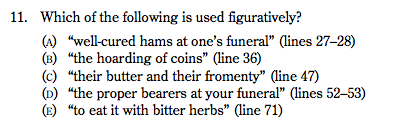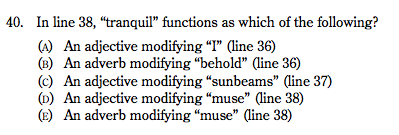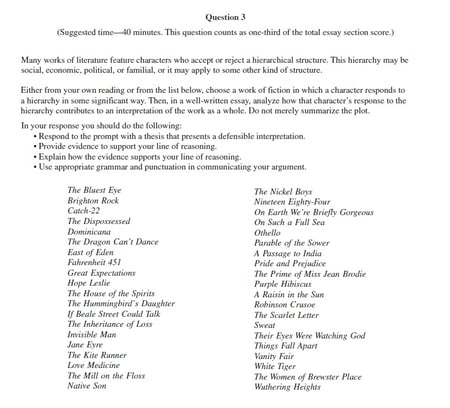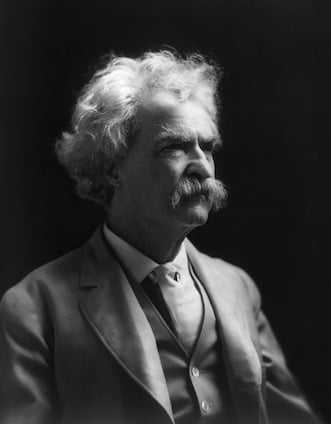

How to Encourage Students to Master the AP Lit Thesis
- December 1, 2021
- AP Literature , Writing
For years, I have used a Poem of the Week as part of my poetry instruction in AP Literature . Last year, because the pandemic resulted in hybrid instruction and only 50% (or fewer) of my kids were in class at a time, I wanted to be sure that I put some significant emphasis on AP Lit thesis writing.
As part of our weekly poem study, the Friday prompt became an AP-style poetry essay prompt. Students only needed to write a thesis. And early in the year, it became evident that our thesis statements needed work.

AP Literature Thesis Statements and “The Point”
When the College Board came out with the new rubrics in 2019, they set aside a point that is designated for the thesis. It’s one point and students either get it or they don’t. And truthfully, it is not that hard to “get” the point. Students must simply “provide a defensible interpretation in response to the prompt” which could be supported by the text (for more, see AP Central). So in other words, students must be able to find *something* in the text that they can write about beyond a summary.
Early on, I observed two things: 1. Not all AP Lit thesis statement are created equal (even if they do earn the point) and 2. Students needed help moving from making a base claim to making a strong claims that lead to better analysis later in the essay.
AP Lit Thesis Starting Points
At the beginning of the year, my kids were writing things like
- The author uses metaphors to reveal that life gives you new, and endless opportunities each and every day.
- Merriam’s use of her metaphor for a new day in “Metaphor” reveals her positive outlook on life.
- eve marriam’s use of metaphor shows that she feels that every day is new day to write your own story.
- Love can cause pain
- Lowell uses diction and figurative language to show her intimate and spiritual connection to her partner in the poem
- Through Lowell’s uses of poetic elements and techniques, she’s able to carefully convert the speaker’s complex relationship with whoever they’re addressing.
While indeed some of these would earn the thesis point, they do no convey the depth that a good, strong AP Lit thesis will. We want students to address the complexity of the text and these just don’t cut it.
The Issue of Complexity
So the first step in helping students to develop a strong thesis is to get beyond just repeating the topic with a few elements of author’s craft thrown in. They have to be sure that they are fully addressing the complexity of the topic highlighted by the task.
The first set of thesis statements above go with Eve Merriam’s poem “Metaphor.” This is my favorite poem to start the school year with because it reflects where we are. Each school year is also like a “new sheet of paper.”
We spend the week discussing the poem ( My daily prompts are available here. ) Then on Friday, I present students with the following prompt:
In Eve Merriam’s poem “Metaphor” (1986), the speaker portrays the blankness of a new day. In a well written essay, analyze how Merriam uses poetic elements and techniques to convey the speaker’s complex attitude toward life.
And while all of the above thesis statements DO say something about her attitude toward life, none of them get to how it is complex. So the first step is to get students thinking about contrasts within the poem and other elements that help add to the depth of the text. A good way to do this might be through the Interstate, Microscope and Compass Technique from Gina at Lit and More.

AP® Lit Literary Argument
Once students see complexity in a text, they can move into developing a more complex AP® literature thesis statement.
It is also important to remind them that the College Board calls these essays “literary argument.” And an argument is by definition something that has two sides. When we teach argument writing to our English 11 students in preparation for the New York State English Regents we encourage them to include the counterargument in their thesis. And although a literary argument doesn’t necessarily have a counterargument, it should have two sides. In other words, complexity.
In these early stages, it is sometimes useful to give the students complexity starters that they can use as the basis of their thesis statements. This is a list that I provide to my students:
- even though x, y is also true
- not only j, but also k
- although d, also e
- nevertheless
- notwithstanding
- in contrast
This list along with other helpful tips on writing AP Literature Thesis Statements is included in my AP Thesis Anchor charts here .

AP® Lit Thesis Examples
As we work through the year, thesis statements that once read “love can cause pain” become
“Even though Edith Matilda Thomas’s poem entitled “Winter Sleep” appears to be a simplistic take about growing old she also uses poetic elements such as symbolism, diction, and parallel structure to convey a complex attitude towards aging as she looks back on her life.”
“Although the speaker is reflecting on the spring-like happiness of her youth, she understands that death is coming as she moves into the metaphorical winter of her life due to her old age.”

Building on Complexity
The key to helping students earn the thesis point on the AP Literature Rubric is to help them understand that they are writing a literary argument and that an argument by its very nature has two sides or two part. Then include both of those sides in your thesis.
For more help in AP Lit Writing, be sure to check out these other AP Lit Essay Writing Anchor Charts.
more from the blog

Teaching Allusion in Literature in High School English
Only a few years ago, I could count on that one kid to recognize the allusions in literature that we would encounter in our shared

Classroom Procedures and Routines: Bell Work in High School English
People thrive on routines. And even more importantly, kids and students need routines to help them feel less stressed and more focused in the classroom.

Text Complexity for AP English
On the AP® Literature exam, both the Poetry Free Response Question and the Prose Free Response Question ask students to consider the text complexity of
3 Responses
- Pingback: Teaching Students How to Write Literary Analysis Paper in Six Easy Steps - The Teacher ReWrite
Is there a way to get working links. Both the link to the poem and the link to the daily prompts are both broken and give an error message when clicked.
Thank you for bringing that to my attention. These links are fixed now.
Leave a Reply Cancel reply
Your email address will not be published. Required fields are marked *
Save my name, email, and website in this browser for the next time I comment.

Hi, I'm Jeanmarie!
I help AP Literature and High School English teachers create engaging classrooms so that students will be prepared college and beyond.
Learn more about me and how I can help you here
Let's Connect!

Your free guide to planning a full year of AP Literature

AP® is a trademark registered by the College Board, which is not affiliated with, and does not endorse, this product.
Sign Up to Stay Posted About All Things GOE !
Thanks for being AWESOME!
.jpg)
Take me to Lang!

Take me to Lit!
Below you'll find comprehensive resources to assist in preparing for ap®* english exams. the lang materials are for students and teachers. the lit materials are for teachers .

Get excited for this exclusive Garden of English video series that includes guided notes, self-guided practice, exclusive multiple choice questions with rationales, and practice exam & scoring opportunities. All of what we've created is meant to help y ou do better in your AP ®* English Language class and help you score higher on your AP®* exam. It's the BEST exam review guide you can get!
You can grab the COURSE & EXAM GUIDE Now by Clicking Here:
*AP® is a trademark registered to and owned by the College Board, which is not affiliated with, and does not endorse, this product.

Lit Sup port from the Garden of English provides teachers with a myriad supplemental materials for any AP®* English Literature classroom.
In this resource you will find:
Digital and Print Assignments for existing GOE Lit Essay YouTube Writing Videos.
9 Unit Tests that are Fully Aligned with the AP®* Lit CED.
Answer Guides, Suggested Rubrics, & Multiple Choice Rationales
A Full Practice Lit Exam (with Rationales, Sample Responses, Scoring Commentary, Self-Assessment Rubrics, & Scoring Sheets)
Novel-Based, Specialty, and Thematic Prompt Packets for Commonly Taught Works
Access to ALL of the Garden of English's Literature Poster Files
Consistent updates and upgrades over the life of the pr oduct
Teachers can grab GOE's LIT SUPPORT Now by Clicking Below :
Calculate for all schools
Your chance of acceptance, your chancing factors, extracurriculars, creating a thesis for ap lit.
This year, I'm taking AP Lit and I'm struggling with writing thesis statements for my essays. Does anyone have any tips or insight on how to write a solid thesis statement for AP Lit essays?
I can definitely give you some advice on how to create a solid thesis statement for your AP Lit essays. In AP Lit, your thesis statement should provide a clear, original, and specific claim about your chosen literary work, which your essay will then analyze and support with textual evidence.
Here are a few steps you can follow to create a strong thesis statement:
1. Read the prompt carefully: Make sure you understand what the prompt is asking you to do, whether it's analyzing a specific aspect of the text, exploring a theme, or discussing a particular character.
2. Choose a clear and specific focus: Decide what aspect of the work you want to explore, such as characterization, theme, symbolism, or structure. Your thesis statement should be specific enough that your analysis doesn't become too broad or unfocused.
3. Make an original claim: Your thesis statement should present an original argument or interpretation, rather than merely stating an obvious fact or restating the prompt. Make sure your claim is one that can be both supported by evidence from the text and challenged by other interpretations.
4. Include some direction for your essay: A strong thesis statement not only makes a claim but also gives some indication of how your essay will support that claim. This helps guide your reader and sets up the organization of your essay.
For example: In The Great Gatsby , F. Scott Fitzgerald uses the contrasting settings of East Egg, West Egg, and the Valley of Ashes to illustrate the corrupting influence of wealth and social class on the characters and their ultimate disillusionment with the American Dream.
In this thesis statement, the focus is on the contrasting settings and their impact on the characters, making a specific claim about the author's intent. It provides direction for the essay, indicating that the writer will explore how Fitzgerald uses these settings to convey his message.
Remember, writing a strong thesis statement takes practice, so keep working at it and tweaking it until you feel confident in your ability to craft a well-argued and coherent claim about the text. Good luck in your AP Lit class!
About CollegeVine’s Expert FAQ
CollegeVine’s Q&A seeks to offer informed perspectives on commonly asked admissions questions. Every answer is refined and validated by our team of admissions experts to ensure it resonates with trusted knowledge in the field.
What are your chances of acceptance?
Calculate for all schools, your chance of acceptance.
Your chancing factors
Extracurriculars.
How to Write the AP Lit Prose Essay + Example
Do you know how to improve your profile for college applications.
See how your profile ranks among thousands of other students using CollegeVine. Calculate your chances at your dream schools and learn what areas you need to improve right now — it only takes 3 minutes and it's 100% free.
Show me what areas I need to improve
What’s Covered
What is the ap lit prose essay, how will ap scores affect my college chances.
AP Literature and Composition (AP Lit), not to be confused with AP English Language and Composition (AP Lang), teaches students how to develop the ability to critically read and analyze literary texts. These texts include poetry, prose, and drama. Analysis is an essential component of this course and critical for the educational development of all students when it comes to college preparation. In this course, you can expect to see an added difficulty of texts and concepts, similar to the material one would see in a college literature course.
While not as popular as AP Lang, over 380,136 students took the class in 2019. However, the course is significantly more challenging, with only 49.7% of students receiving a score of three or higher on the exam. A staggeringly low 6.2% of students received a five on the exam.
The AP Lit exam is similar to the AP Lang exam in format, but covers different subject areas. The first section is multiple-choice questions based on five short passages. There are 55 questions to be answered in 1 hour. The passages will include at least two prose fiction passages and two poetry passages and will account for 45% of your total score. All possible answer choices can be found within the text, so you don’t need to come into the exam with prior knowledge of the passages to understand the work.
The second section contains three free-response essays to be finished in under two hours. This section accounts for 55% of the final score and includes three essay questions: the poetry analysis essay, the prose analysis essay, and the thematic analysis essay. Typically, a five-paragraph format will suffice for this type of writing. These essays are scored holistically from one to six points.
Today we will take a look at the AP Lit prose essay and discuss tips and tricks to master this section of the exam. We will also provide an example of a well-written essay for review.
The AP Lit prose essay is the second of the three essays included in the free-response section of the AP Lit exam, lasting around 40 minutes in total. A prose passage of approximately 500 to 700 words and a prompt will be given to guide your analytical essay. Worth about 18% of your total grade, the essay will be graded out of six points depending on the quality of your thesis (0-1 points), evidence and commentary (0-4 points), and sophistication (0-1 points).
While this exam seems extremely overwhelming, considering there are a total of three free-response essays to complete, with proper time management and practiced skills, this essay is manageable and straightforward. In order to enhance the time management aspect of the test to the best of your ability, it is essential to understand the following six key concepts.
1. Have a Clear Understanding of the Prompt and the Passage
Since the prose essay is testing your ability to analyze literature and construct an evidence-based argument, the most important thing you can do is make sure you understand the passage. That being said, you only have about 40 minutes for the whole essay so you can’t spend too much time reading the passage. Allot yourself 5-7 minutes to read the prompt and the passage and then another 3-5 minutes to plan your response.
As you read through the prompt and text, highlight, circle, and markup anything that stands out to you. Specifically, try to find lines in the passage that could bolster your argument since you will need to include in-text citations from the passage in your essay. Even if you don’t know exactly what your argument might be, it’s still helpful to have a variety of quotes to use depending on what direction you take your essay, so take note of whatever strikes you as important. Taking the time to annotate as you read will save you a lot of time later on because you won’t need to reread the passage to find examples when you are in the middle of writing.
Once you have a good grasp on the passage and a solid array of quotes to choose from, you should develop a rough outline of your essay. The prompt will provide 4-5 bullets that remind you of what to include in your essay, so you can use these to structure your outline. Start with a thesis, come up with 2-3 concrete claims to support your thesis, back up each claim with 1-2 pieces of evidence from the text, and write a brief explanation of how the evidence supports the claim.
2. Start with a Brief Introduction that Includes a Clear Thesis Statement
Having a strong thesis can help you stay focused and avoid tangents while writing. By deciding the relevant information you want to hit upon in your essay up front, you can prevent wasting precious time later on. Clear theses are also important for the reader because they direct their focus to your essential arguments.
In other words, it’s important to make the introduction brief and compact so your thesis statement shines through. The introduction should include details from the passage, like the author and title, but don’t waste too much time with extraneous details. Get to the heart of your essay as quick as possible.
3. Use Clear Examples to Support Your Argument
One of the requirements AP Lit readers are looking for is your use of evidence. In order to satisfy this aspect of the rubric, you should make sure each body paragraph has at least 1-2 pieces of evidence, directly from the text, that relate to the claim that paragraph is making. Since the prose essay tests your ability to recognize and analyze literary elements and techniques, it’s often better to include smaller quotes. For example, when writing about the author’s use of imagery or diction you might pick out specific words and quote each word separately rather than quoting a large block of text. Smaller quotes clarify exactly what stood out to you so your reader can better understand what are you saying.
Including smaller quotes also allows you to include more evidence in your essay. Be careful though—having more quotes is not necessarily better! You will showcase your strength as a writer not by the number of quotes you manage to jam into a paragraph, but by the relevance of the quotes to your argument and explanation you provide. If the details don’t connect, they are merely just strings of details.
4. Discussion is Crucial to Connect Your Evidence to Your Argument
As the previous tip explained, citing phrases and words from the passage won’t get you anywhere if you don’t provide an explanation as to how your examples support the claim you are making. After each new piece of evidence is introduced, you should have a sentence or two that explains the significance of this quote to the piece as a whole.
This part of the paragraph is the “So what?” You’ve already stated the point you are trying to get across in the topic sentence and shared the examples from the text, so now show the reader why or how this quote demonstrates an effective use of a literary technique by the author. Sometimes students can get bogged down by the discussion and lose sight of the point they are trying to make. If this happens to you while writing, take a step back and ask yourself “Why did I include this quote? What does it contribute to the piece as a whole?” Write down your answer and you will be good to go.
5. Write a Brief Conclusion
While the critical part of the essay is to provide a substantive, organized, and clear argument throughout the body paragraphs, a conclusion provides a satisfying ending to the essay and the last opportunity to drive home your argument. If you run out of time for a conclusion because of extra time spent in the preceding paragraphs, do not worry, as that is not fatal to your score.
Without repeating your thesis statement word for word, find a way to return to the thesis statement by summing up your main points. This recap reinforces the arguments stated in the previous paragraphs, while all of the preceding paragraphs successfully proved the thesis statement.
6. Don’t Forget About Your Grammar
Though you will undoubtedly be pressed for time, it’s still important your essay is well-written with correct punctuating and spelling. Many students are able to write a strong thesis and include good evidence and commentary, but the final point on the rubric is for sophistication. This criteria is more holistic than the former ones which means you should have elevated thoughts and writing—no grammatical errors. While a lack of grammatical mistakes alone won’t earn you the sophistication point, it will leave the reader with a more favorable impression of you.

Discover your chances at hundreds of schools
Our free chancing engine takes into account your history, background, test scores, and extracurricular activities to show you your real chances of admission—and how to improve them.
[amp-cta id="9459"]
Here are Nine Must-have Tips and Tricks to Get a Good Score on the Prose Essay:
- Carefully read, review, and underline key instruction s in the prompt.
- Briefly outlin e what you want to cover in your essay.
- Be sure to have a clear thesis that includes the terms mentioned in the instructions, literary devices, tone, and meaning.
- Include the author’s name and title in your introduction. Refer to characters by name.
- Quality over quantity when it comes to picking quotes! Better to have a smaller number of more detailed quotes than a large amount of vague ones.
- Fully explain how each piece of evidence supports your thesis .
- Focus on the literary techniques in the passage and avoid summarizing the plot.
- Use transitions to connect sentences and paragraphs.
- Keep your introduction and conclusion short, and don’t repeat your thesis verbatim in your conclusion.
Here is an example essay from 2020 that received a perfect 6:
[1] In this passage from a 1912 novel, the narrator wistfully details his childhood crush on a girl violinist. Through a motif of the allure of musical instruments, and abundant sensory details that summon a vivid image of the event of their meeting, the reader can infer that the narrator was utterly enraptured by his obsession in the moment, and upon later reflection cannot help but feel a combination of amusement and a resummoning of the moment’s passion.
[2] The overwhelming abundance of hyper-specific sensory details reveals to the reader that meeting his crush must have been an intensely powerful experience to create such a vivid memory. The narrator can picture the “half-dim church”, can hear the “clear wail” of the girl’s violin, can see “her eyes almost closing”, can smell a “faint but distinct fragrance.” Clearly, this moment of discovery was very impactful on the boy, because even later he can remember the experience in minute detail. However, these details may also not be entirely faithful to the original experience; they all possess a somewhat mysterious quality that shows how the narrator may be employing hyperbole to accentuate the girl’s allure. The church is “half-dim”, the eyes “almost closing” – all the details are held within an ethereal state of halfway, which also serves to emphasize that this is all told through memory. The first paragraph also introduces the central conciet of music. The narrator was drawn to the “tones she called forth” from her violin and wanted desperately to play her “accompaniment.” This serves the double role of sensory imagery (with the added effect of music being a powerful aural image) and metaphor, as the accompaniment stands in for the narrator’s true desire to be coupled with his newfound crush. The musical juxtaposition between the “heaving tremor of the organ” and the “clear wail” of her violin serves to further accentuate how the narrator percieved the girl as above all other things, as high as an angel. Clearly, the memory of his meeting his crush is a powerful one that left an indelible impact on the narrator.
[3] Upon reflecting on this memory and the period of obsession that followed, the narrator cannot help but feel amused at the lengths to which his younger self would go; this is communicated to the reader with some playful irony and bemused yet earnest tone. The narrator claims to have made his “first and last attempts at poetry” in devotion to his crush, and jokes that he did not know to be “ashamed” at the quality of his poetry. This playful tone pokes fun at his childhood self for being an inexperienced poet, yet also acknowledges the very real passion that the poetry stemmed from. The narrator goes on to mention his “successful” endeavor to conceal his crush from his friends and the girl; this holds an ironic tone because the narrator immediately admits that his attempts to hide it were ill-fated and all parties were very aware of his feelings. The narrator also recalls his younger self jumping to hyperbolic extremes when imagining what he would do if betrayed by his love, calling her a “heartless jade” to ironically play along with the memory. Despite all this irony, the narrator does also truly comprehend the depths of his past self’s infatuation and finds it moving. The narrator begins the second paragraph with a sentence that moves urgently, emphasizing the myriad ways the boy was obsessed. He also remarks, somewhat wistfully, that the experience of having this crush “moved [him] to a degree which now [he] can hardly think of as possible.” Clearly, upon reflection the narrator feels a combination of amusement at the silliness of his former self and wistful respect for the emotion that the crush stirred within him.
[4] In this passage, the narrator has a multifaceted emotional response while remembering an experience that was very impactful on him. The meaning of the work is that when we look back on our memories (especially those of intense passion), added perspective can modify or augment how those experiences make us feel
More essay examples, score sheets, and commentaries can be found at College Board .
While AP Scores help to boost your weighted GPA, or give you the option to get college credit, AP Scores don’t have a strong effect on your admissions chances . However, colleges can still see your self-reported scores, so you might not want to automatically send scores to colleges if they are lower than a 3. That being said, admissions officers care far more about your grade in an AP class than your score on the exam.
Related CollegeVine Blog Posts


Choose Your Test
Sat / act prep online guides and tips, expert's guide to the ap literature exam.
Advanced Placement (AP)

If you're planning to take the AP English Literature and Composition exam, you'll need to get familiar with what to expect on the test. Whether the 2023 test date of Wednesday, May 3, is near or far, I'm here to help you get serious about preparing for the exam.
In this guide, I'll go over the test's format and question types, how it's graded, best practices for preparation, and test-day tips. You'll be on your way to AP English Lit success in no time!
AP English Literature: Exam Format and Question Types
The AP Literature Exam is a three-hour exam that contains two sections in this order:
- An hour-long, 55-question multiple-choice section
- A two-hour, three-question free-response section
The exam tests your ability to analyze works and excerpts of literature and cogently communicate that analysis in essay form.
Read on for a breakdown of the two different sections and their question types.

Section I: Multiple Choice
The multiple-choice section, or Section I of the AP Literature exam, is 60 minutes long and has 55 questions. It counts for 45% of your overall exam grade .
You can expect to see five excerpts of prose and poetry. You will always get at least two prose passages (fiction or drama) and two poetry passages. In general, you will not be given the author, date, or title for these works, though occasionally the title of a poem will be given. Unusual words are also sometimes defined for you.
The date ranges of these works could fall from the 16th to the 21st century. Most works will be originally written in English, but you might occasionally see a passage in translation.
There are, generally speaking, eight kinds of questions you can expect to see on the AP English Literature and Composition exam. I'll break each of them down here and give you tips on how to identify and approach them.

"Pretty flowers carried by ladies" is not one of the question types.
The 8 Multiple-Choice Question Types on the AP Literature Exam
Without further delay, here are the eight question types you can expect to see on the AP Lit exam. All questions are taken from the sample questions on the AP Course and Exam Description .
#1: Reading Comprehension
These questions test your ability to understand what the passage is saying on a pretty basic level . They don't require you to do a lot of interpretation—you just need to know what's going on.
You can identify this question type from words and phrases such as "according to," "mentioned," "asserting," and so on. You'll succeed on these questions as long as you carefully read the text . Note that you might have to go back and reread parts to make sure you understand what the passage is saying.

#2: Inference
These questions ask you to infer something—a character or narrator's opinion, an author's intention, etc.—based on what is said in the passage . It will be something that isn't stated directly or concretely but that you can assume based on what's clearly written in the passage. You can identify these questions from words such as "infer" and "imply."
The key to these questions is to not get tripped up by the fact that you are making an inference—there will be a best answer, and it will be the choice that is best supported by what is actually found in the passage .
In many ways, inference questions are like second-level reading comprehension questions: you need to know not just what a passage says, but also what it means.

#3: Identifying and Interpreting Figurative Language
These are questions for which you have to either identify what word or phrase is figurative language or provide the meaning of a figurative phrase . You can identify these as they will either explicitly mention figurative language (or a figurative device, such as a simile or metaphor ) or include a figurative phrase in the question itself.
The meaning of figurative phrases can normally be determined by that phrase's context in the passage—what is said around it? What is the phrase referring to?
Example 1: Identifying

Example 2: Interpreting

#4: Literary Technique
These questions involve identifying why an author does what they do , from using a particular phrase to repeating certain words. Basically, what techniques is the author using to construct the passage/poem, and to what effect?
You can identify these questions by words/phrases such as "serves chiefly to," "effect," "evoke," and "in order to." A good way to approach these questions is to ask yourself: so what? Why did the author use these particular words or this particular structure?

#5: Character Analysis
These questions ask you to describe something about a character . You can spot them because they will refer directly to characters' attitudes, opinions, beliefs, or relationships with other characters .
This is, in many ways, a special kind of inference question , since you are inferring the broader personality of the character based on the evidence in a passage. Also, these crop up much more commonly for prose passages than they do for poetry ones.

#6: Overall Passage Questions
Some questions ask you to identify or describe something about the passage or poem as a whole : its purpose, tone, genre, etc. You can identify these by phrases such as "in the passage" and "as a whole."
To answer these questions, you need to think about the excerpt with a bird's-eye view . What is the overall picture created by all the tiny details?

#7: Structure
Some AP Lit questions will ask you about specific structural elements of the passage: a shift in tone, a digression, the specific form of a poem, etc . Often these questions will specify a part of the passage/poem and ask you to identify what that part is accomplishing.
Being able to identify and understand the significance of any shifts —structural, tonal, in genre, and so on—will be of key importance for these questions.

#8: Grammar/Nuts & Bolts
Very occasionally you will be asked a specific grammar question , such as what word an adjective is modifying. I'd also include in this category super-specific questions such as those that ask about the meter of a poem (e.g., iambic pentameter).
These questions are less about literary artistry and more about the fairly dry technique involved in having a fluent command of the English language .

That covers the eight question types on the multiple-choice section. Now, let's take a look at the free-response section of the AP Literature exam.

Keep track of the nuts and bolts of grammar.
Section II: Free Response
The AP Literature Free Response section is two hours long and involves three free-response essay questions , so you'll have about 40 minutes per essay. That's not a lot of time considering this section of the test counts for 55% of your overall exam grade !
Note, though, that no one will prompt you to move from essay to essay, so you can theoretically divide up the time however you want. Just be sure to leave enough time for each essay! Skipping an essay, or running out of time so you have to rush through one, can really impact your final test score.
The first two essays are literary analysis essays of specific passages, with one poem and one prose excerpt. The final essay is an analysis of a given theme in a work selected by you , the student.
Essays 1 & 2: Literary Passage Analysis
For the first two essays, you'll be presented with an excerpt and directed to analyze the excerpt for a given theme, device, or development . One of the passages will be poetry, and one will be prose. You will be provided with the author of the work, the approximate date, and some orienting information (i.e., the plot context of an excerpt from a novel).
Below are some sample questions from the 2022 Free Response Questions .

Looking for help studying for your AP exam?
Our one-on-one online AP tutoring services can help you prepare for your AP exams. Get matched with a top tutor who got a high score on the exam you're studying for!

Essay 3: Thematic Analysis
For the third and final essay, you'll be asked to discuss a particular theme in a work that you select . You will be provided with a list of notable works that address the given theme below the prompt, but you can also choose to discuss any "work of literary merit."
So while you do have the power to choose which work you wish to write an essay about , the key words here are "literary merit." That means no genre fiction! Stick to safe bets like authors in the list on pages 10-11 of the old 2014 AP Lit Course Description .
(I know, I know—lots of genre fiction works do have literary merit and Shakespeare actually began as low culture, and so on and so forth. Indeed, you might find academic designations of "literary merit" elitist and problematic, but the time to rage against the literary establishment is not your AP Lit test! Save it for a really, really good college admissions essay instead .)
Here's a sample question from 2022:

As you can see, the list of works provided spans many time periods and countries : there are ancient Greek plays ( Antigone ), modern literary works (such as Margaret Atwood's The Handmaid's Tale ), Shakespeare plays ( The Tempest ), 19th-century English plays ( The Importance of Being Earnest ), etc. So you have a lot to work with!
Also note that you can choose a work of "comparable literary merit." That means you can select a work not on this list as long as it's as difficult and meaningful as the example titles you've been given. So for example, Jane Eyre or East of Eden would be great choices, but Twilight or The Hunger Games would not.
Our advice? If you're not sure what a work of "comparable literary merit" is, stick to the titles on the provided list .

You might even see something by this guy.
How Is the AP Literature Test Graded?
The multiple-choice section of the exam comprises 45% of your total exam score; the three essays, or free-response section, comprise the other 55%. Each essay, then, is worth about 18% of your grade.
As on other AP exams, your raw score will be converted to a score from 1-5 . You don't have to get every point possible to get a 5 by any means. In 2022, 16.9% of students received 5s on the AP English Literature test, the 14th highest 5 score out of the 38 different AP exams.
So, how do you calculate your raw scores?
Multiple-Choice Scoring
For the multiple-choice section, you receive 1 point for each question you answer correctly . There's no guessing penalty, so you should answer every question—but guess only after you're able to eliminate any answer you know is wrong to up your chances of choosing the right one.
Free-Response Scoring
Scoring for multiple choice is pretty straightforward; however, essay scoring is a little more complicated.
Each of your essays will receive a score from 0 to 6 based on the College Board rubric , which also includes question-specific rubrics. All the rubrics are very similar, with only minor differences between them.
Each essay rubric has three elements you'll be graded on:
- Thesis (0-1 points)
- Evidence and Commentary (0-4 points)
- Sophistication (0-1 points)
We'll be looking at the current rubric for the AP Lit exam , which was released in September 2019, and what every score means for each of the three elements above:
To get a high-scoring essay in the 5-6 point range, you'll need to not only come up with an original and intriguing argument that you thoroughly support with textual evidence, but you’ll also need to stay focused, organized, and clear. And all in just 40 minutes per essay!
If getting a high score on this section sounds like a tall order, that's because it is.

Practice makes perfect!
Skill-Building for Success on the AP Literature Exam
There are several things you can do to hone your skills and best prepare for the AP Lit exam.
Read Some Books, Maybe More Than Once
One of the most important steps you can take to prepare for the AP Literature and Composition exam is to read a lot and read well . You'll be reading a wide variety of notable literary works in your AP English Literature course, but additional reading will help you further develop your analytical reading skills .
I suggest checking out this list of notable authors in the 2014 AP Lit Course Description (pages 10-11).
In addition to reading broadly, you'll want to become especially familiar with the details of four to five books with different themes so you'll be prepared to write a strong student-choice essay. You should know the plot, themes, characters, and structural details of these books inside and out.
See my AP English Literature Reading List for more guidance.
Read (and Interpret) Poetry
One thing students might not do very much on their own time but that will help a lot with AP Lit exam prep is to read poetry. Try to read poems from a lot of eras and authors to get familiar with the language.
We know that poetry can be intimidating. That's why we've put together a bunch of guides to help you crack the poetry code (so to speak). You can learn more about poetic devices —like imagery and i ambic pentameter —in our comprehensive guide. Then you can see those analytical skills in action in our expert analysis of " Do not go gentle into that good night " by Dylan Thomas.
When you think you have a grip on basic comprehension, you can then move on to close reading (see below).
Hone Your Close Reading and Analysis Skills
Your AP class will likely focus heavily on close reading and analysis of prose and poetry, but extra practice won't hurt you. Close reading is the ability to identify which techniques the author is using and why. You'll need to be able to do this both to gather evidence for original arguments on the free-response questions and to answer analytical multiple-choice questions.
Here are some helpful close reading resources for prose :
- University of Wisconsin-Madison Writing Center's guide to close reading
- Harvard College Writing Center's close reading guide
- Purdue OWL's article on steering clear of close reading "pitfalls"
And here are some for poetry :
- University of Wisconsin-Madison's poetry-reading guide
- This guide to reading poetry at Poets.org (complete with two poetry close readings)
- Our own expert analyses of famous poems, such as " Ozymandias ", and the 10 famous sonnets you should know
Learn Literary and Poetic Devices
You'll want to be familiar with literary terms so that any test questions that ask about them will make sense to you. Again, you'll probably learn most of these in class, but it doesn't hurt to brush up on them.
Here are some comprehensive lists of literary terms with definitions :
- The 31 Literary Devices You Must Know
- The 20 Poetic Devices You Must Know
- The 9 Literary Elements You'll Find In Every Story
- What Is Imagery?
- Understanding Assonance
- What Is Iambic Pentameter in Poetry?
- Simile vs Metaphor: The 1 Big Difference
- 10 Personification Examples in Poetry, Literature, and More
Practice Writing Essays
The majority of your grade on the AP English Lit exam comes from essays, so it's critical that you practice your timed essay-writing skills . You of course should use the College Board's released free-response questions to practice writing complete timed essays of each type, but you can also practice quickly outlining thorough essays that are well supported with textual evidence.
Take Practice Tests
Taking practice tests is a great way to prepare for the exam. It will help you get familiar with the exam format and overall experience . You can get sample questions from the Course and Exam Description , the College Board website , and our guide to AP English Lit practice test resources .
Be aware that the released exams don't have complete slates of free-response questions, so you might need to supplement these with released free-response questions .
Since there are three complete released exams, you can take one toward the beginning of your prep time to get familiar with the exam and set a benchmark, and one toward the end to make sure the experience is fresh in your mind and to check your progress.

Don't wander like a lonely cloud through your AP Lit prep.
AP Literature: 6 Critical Test-Day Tips
Before we wrap up, here are my six top tips for AP Lit test day:
- #1: On the multiple-choice section, it's to your advantage to answer every question. If you eliminate all the answers you know are wrong before guessing, you'll raise your chances of guessing the correct one.
- #2: Don't rely on your memory of the passage when answering multiple-choice questions (or when writing essays, for that matter). Look back at the passage!
- #3: Interact with the text : circle, mark, underline, make notes—whatever floats your boat. This will help you retain information and actively engage with the passage.
- #4: This was mentioned above, but it's critical that you know four to five books well for the student-choice essay . You'll want to know all the characters, the plot, the themes, and any major devices or motifs the author uses throughout.
- #5: Be sure to plan out your essays! Organization and focus are critical for high-scoring AP Literature essays. An outline will take you a few minutes, but it will help your writing process go much faster.
- #6: Manage your time on essays closely. One strategy is to start with the essay you think will be the easiest to write. This way you'll be able to get through it while thinking about the other two essays.

And don't forget to eat breakfast! Apron optional.
AP Literature Exam: Key Takeaways
The AP Literature exam is a three-hour test that includes an hour-long multiple-choice section based on five prose and poetry passages and with 55 questions, and a two-hour free-response section with three essays : one analyzing a poetry passage, one analyzing a prose passage, and one analyzing a work chosen by you, the student.
The multiple-choice section is worth 45% of your total score , and the free-response section is worth 55% . The three essays are each scored on a rubric of 0-6, and raw scores are converted to a final scaled score from 1 to 5.
Here are some things you can do to prepare for the exam:
- Read books and be particularly familiar with four to five works for the student-choice essays
- Read poetry
- Work on your close reading and analysis skills
- Learn common literary devices
- Practice writing essays
- Take practice tests!
On test day, be sure to really look closely at all the passages and really interact with them by marking the text in a way that makes sense to you. This will help on both multiple-choice questions and the free-response essays. You should also outline your essays before you write them.
With all this in mind, you're well on your way to AP Lit success!
What's Next?
If you're taking other AP exams this year, you might be interested in our other AP resources: from the Ultimate Guide to the US History Exam , to the Ultimate AP Chemistry Study Guide , to the Best AP Psychology Study Guide , we have tons of articles on AP courses and exams for you !
Looking for practice exams? Here are some tips on how to find the best AP practice tests . We've also got comprehensive lists of practice tests for AP Psychology , AP Biology , AP Chemistry , and AP US History .
Deciding which APs to take? Take a look through the complete list of AP courses and tests , read our analysis of which AP classes are the hardest and easiest , and learn how many AP classes you should take .

Want to build the best possible college application?
We can help. PrepScholar Admissions is the world's best admissions consulting service. We combine world-class admissions counselors with our data-driven, proprietary admissions strategies . We've overseen thousands of students get into their top choice schools , from state colleges to the Ivy League.
We know what kinds of students colleges want to admit. We want to get you admitted to your dream schools .
Learn more about PrepScholar Admissions to maximize your chance of getting in.

Ellen has extensive education mentorship experience and is deeply committed to helping students succeed in all areas of life. She received a BA from Harvard in Folklore and Mythology and is currently pursuing graduate studies at Columbia University.
Student and Parent Forum
Our new student and parent forum, at ExpertHub.PrepScholar.com , allow you to interact with your peers and the PrepScholar staff. See how other students and parents are navigating high school, college, and the college admissions process. Ask questions; get answers.

Ask a Question Below
Have any questions about this article or other topics? Ask below and we'll reply!
Improve With Our Famous Guides
- For All Students
The 5 Strategies You Must Be Using to Improve 160+ SAT Points
How to Get a Perfect 1600, by a Perfect Scorer
Series: How to Get 800 on Each SAT Section:
Score 800 on SAT Math
Score 800 on SAT Reading
Score 800 on SAT Writing
Series: How to Get to 600 on Each SAT Section:
Score 600 on SAT Math
Score 600 on SAT Reading
Score 600 on SAT Writing
Free Complete Official SAT Practice Tests
What SAT Target Score Should You Be Aiming For?
15 Strategies to Improve Your SAT Essay
The 5 Strategies You Must Be Using to Improve 4+ ACT Points
How to Get a Perfect 36 ACT, by a Perfect Scorer
Series: How to Get 36 on Each ACT Section:
36 on ACT English
36 on ACT Math
36 on ACT Reading
36 on ACT Science
Series: How to Get to 24 on Each ACT Section:
24 on ACT English
24 on ACT Math
24 on ACT Reading
24 on ACT Science
What ACT target score should you be aiming for?
ACT Vocabulary You Must Know
ACT Writing: 15 Tips to Raise Your Essay Score
How to Get Into Harvard and the Ivy League
How to Get a Perfect 4.0 GPA
How to Write an Amazing College Essay
What Exactly Are Colleges Looking For?
Is the ACT easier than the SAT? A Comprehensive Guide
Should you retake your SAT or ACT?
When should you take the SAT or ACT?
Stay Informed
Get the latest articles and test prep tips!
Looking for Graduate School Test Prep?
Check out our top-rated graduate blogs here:
GRE Online Prep Blog
GMAT Online Prep Blog
TOEFL Online Prep Blog
Holly R. "I am absolutely overjoyed and cannot thank you enough for helping me!”
5 Argument Thesis Templates (AP Lang)

- Word Document File
Description
Here are 5 argument thesis templates that prompt students to write complex claims. Each template has a corresponding example. If you'd like to access the prompt these are in response to, feel free to reach out directly to me.
Questions & Answers
The garden of english.
- We're hiring
- Help & FAQ
- Privacy policy
- Student privacy
- Terms of service
- Tell us what you think

IMAGES
VIDEO
COMMENTS
Body Paragraphing Template: TS (What and Why): (Chronological phrasing), (Last Name) (lit element/technique 1) in order to (textual understanding). Textual Evidence (Where): Take, for example, how (insert context and textual evidence that shows the verb/device from the topic sentence).
Lit Q2- Conclusions. College Essay Planning Steps. Synthesis Prompt Breakdown. Annotating Literature. Post-9/11 Rhetorical Analysis Example. General Quote Integration. Analytical Summaries Steps 1-6. All resources on this page are free (which is everyone's favorite price)!
THE GARDEN OF ENGLISH. Store WE HAVE MOVED!!!! WWW.THEGARDENOFENGLISH.COM Classroom Posters ... Specialty Essays. Halloween FRQ 1-3: File Size: 184 kb: File Type: pdf: Download File. ... AP Lit Templates with Examples FRQ 1-3: File Size: 295 kb: File Type: pdf:
I don't teach English; I teach students: living, breathing, thoughtful humans. I've been teaching AP Language for over a decade, and I've been in the AP Lit world for almost as long. I've ...
AP English Literature FRQ 3 (open/theme analysis essay) Outline Paragraph 1 THESIS: analytical statement that addresses all requirements of the prompt and notes text's complexity In (1) title, (2) author employs or examines (3) character(s) OR relationship(s) OR scene(s) OR device(s) to (4) strong and specific verb (5) central topic, ultimately revealing that (6) theme (assertion about human ...
So in other words, students must be able to find *something* in the text that they can write about beyond a summary. Early on, I observed two things: 1. Not all AP Lit thesis statement are created equal (even if they do earn the point) and 2. Students needed help moving from making a base claim to making a strong claims that lead to better ...
The Lit materials are for teachers! Get excited for this exclusive Garden of English video series that includes guided notes, self-guided practice, exclusive multiple choice questions with rationales, and practice exam & scoring opportunities. All of what we've created is meant to help you do better in your AP®* English Language class and help ...
Here are a few steps you can follow to create a strong thesis statement: 1. Read the prompt carefully: Make sure you understand what the prompt is asking you to do, whether it's analyzing a specific aspect of the text, exploring a theme, or discussing a particular character. 2. Choose a clear and specific focus: Decide what aspect of the work ...
Today I offer tips for annotating literature, templates for topic sentences (when analyzing poetry), and a thesis template. I hope this helps!Support the Ga...
AP doesn't stand for agony and pain or anxiety and pressure. It stands for ANSWER THE PROMPT. Today, I show you the ONLY thesis statement you'll ever need ...
When writing conclusions for Rhetorical Analysis essays, students should highlight the ideas the RA Essay Speaker showcases, rather than summarizing their own essays and the author's choices. Once the ideas are highlighted, students need to apply said ideas universally. Steps for generating a strong conclusion are as follows. 1.
A thesis statement: tells the reader how you will interpret the significance of the subject matter under discussion. is a road map for the paper; in other words, it tells the reader what to expect from the rest of the paper. directly answers the question asked of you. A thesis is an interpretation of a question or subject, not the subject itself.
THE GARDEN OF ENGLISH. Store WE HAVE MOVED!!!! WWW.THEGARDENOFENGLISH.COM ... AP Lit Templates with Examples FRQ 1-3: File Size: 295 kb: File Type: pdf: ... most relate to teaching AP English Language or AP English Literature, but they work at all levels. Feel free to download these at will, with no cost.
The AP Lit prose essay is the second of the three essays included in the free-response section of the AP Lit exam, lasting around 40 minutes in total. A prose passage of approximately 500 to 700 words and a prompt will be given to guide your analytical essay. Worth about 18% of your total grade, the essay will be graded out of six points ...
This guide offers templates, steps, and examples for responding effectively to all 3 question types of the AP Lit essay. This is a guide to writing well on the exam.
By The Garden of English. This guide offers templates, steps, and examples for responding effectively to all 3 question types of the AP Lit essay. This is a guide to writing well on the exam. Subjects: ELA Test Prep, Literature, Writing-Essays. Grades: 8th, 9th, 10th, 11th, 12th, Homeschool. Types:
The AP Literature Exam is a three-hour exam that contains two sections in this order: An hour-long, 55-question multiple-choice section. A two-hour, three-question free-response section. The exam tests your ability to analyze works and excerpts of literature and cogently communicate that analysis in essay form.
Today I look at how to quickly outline your question 2 response, produce a well-developed thesis statement, and use templates to create strong topic sentence... AP English Literature and Composition
Course Skills. The AP English Literature and Composition framework included in the course and exam description outlines distinct skills that students should practice throughout the year—skills that will help them learn to read texts critically. Skill Categories. Exam Weighting (Multiple- Choice Section) Explain the function of character. 16% ...
Be the first to ask The Garden of English a question about this product. Here are 5 argument thesis templates that prompt students to write complex claims. Each template has a corresponding example. If you'd like to access the prompt these are in response to, feel free to reach out directly to me. ...
Today I look at how breaking down the prompt will make writing a literary argument (AP Lit Question 3) thesis statement and essay much easier. I also quickl...
Prompt or no prompt, this thesis might just do it all. :) Thesis Do... AP English Literature and Composition.